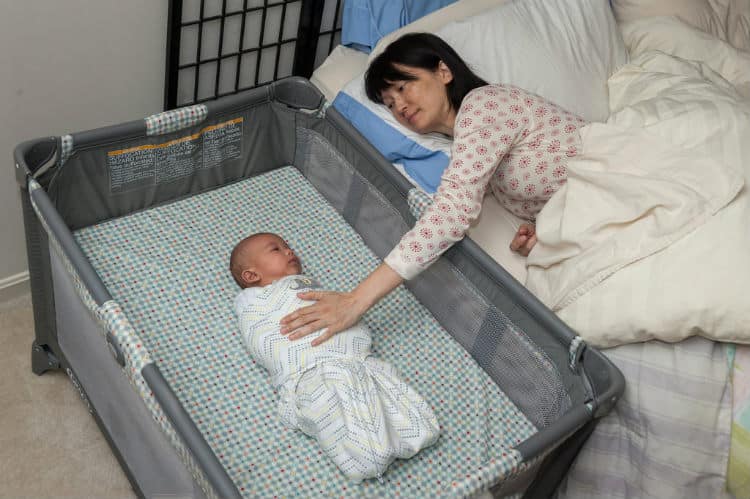Co-sleeping is not a new phenomenon. I know that it can help with breastfeeding, proximity, warmth and sleep for you and the baby during its first months of life. The baby learns to sleep close to you and is reassured by your presence.
According to the Institut national de santé Publique du Québec and the Canadian Pediatric Society, this practice comes with risks. Rules have been provided so that co-sleeping with your baby can take place safely.
The safest place for your baby to sleep is in their crib. You can place it in your bedroom if you want. Manufacturing standards set by Health Canada must be respected. Additionally, the mattress must be firm. All the baby needs is a small blanket. You can read about this in my article called Choosing Baby’s Bed and Mattress.
For safe co-sleeping, you need:
- A firm mattress;
- To avoid softer surfaces, like a couch, pillows, cushions, etc.;
- To maintain a distance between your baby, you, the mattress and the wall to avoid crushing or lodgingthebaby;
- To never let the baby sleep alone in your bed unsupervised. Adult mattresses are often softer than baby mattresses, and babies usually sleep on their side or stomach;
- To avoid heavy hot blankets (they can cover the baby’s head when they move around);
- To prevent excess heat (increases the risk of SIDS 40 times);
At all times you must:
- Never co-sleep with your baby if you have consumed alcohol, drugs or medication;
- Avoid co-sleeping if you are very tired (exhausted);
- Avoid co-sleeping with people who are not its parents.
If you co-sleep and you want to wait for the transition to autonomous sleep in their bed to take place by itself, you can let time take care of this. However, since each child is different, there are no clear standards for when the transition will take place.
However, if you co-sleep and you want to get them used to fall asleep by themselves slowly, you will have to change your baby’s habits. The longer they have been co-sleeping, the more difficult it will be to stop. A baby that has always fallen asleep with their mother, frequently after breastfeeding, will expect to do the same thing every night.
To learn more about the topic, watch my video about Baby Sleep.
Talk soon,
Marie
The Baby Expert
Références :
- Challamel, M-J et M. Thirion. Mon enfant dort mal. Éditions Pocket, 2015.
- Crichton, Georgina E. et B. Symon, Behavioral Management of sleep Problems in infants Under 6 months-What Works, Journal of dev. behav. Pediatrics, volume 37, p. 164-171, 2016.
- Gradisar, Michael et al., Behavioral Interventions for Infant Sleep Problems: A Randomized Controlled Trial, American Academy of Pediatrics, mai 2016.
- Institut national de santé publique du Québec, Guide Mieux vivre avec notre enfant de la grossesse à 2 ans, section sur le sommeil, p. 248-262, 2016.
- Langevin, Brigitte, Le sommeil du nourrisson, nouvelle édition, Éditions de Mortagne, 2016.
- Magazine Enfants Québec, De belles nuits à tous âges, octobre 2013.
- Martello Evelyne, Enfin je dors… et mes parents aussi, 2e édition, Éditions CHU Sainte-Justine, 2015.
- Mindell, J. A. et J. A. Owen. Clinical guide to Pediatric sleep: diagnosis and Management of Sleep Problems. 2e édition, Lippincott William & Wilkins, 2010.
- Revue Bien grandir, En chemin vers de belles nuits, novembre 2011.
- Revue Naître et grandir, Mieux comprendre le sommeil, octobre 2016.
- Pantley, Elizabeth, Un sommeil paisible et sans pleurs, Éditions ADA, 2005.


